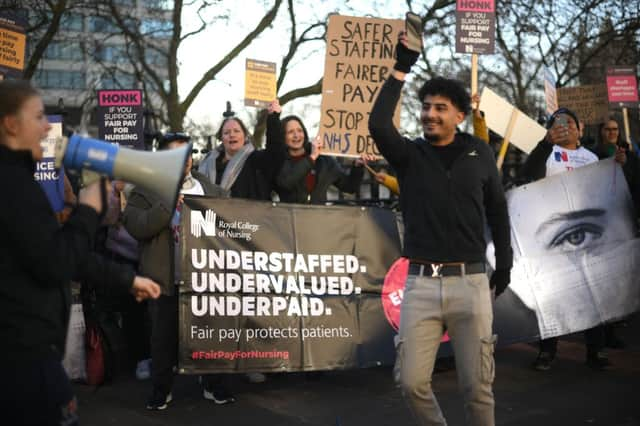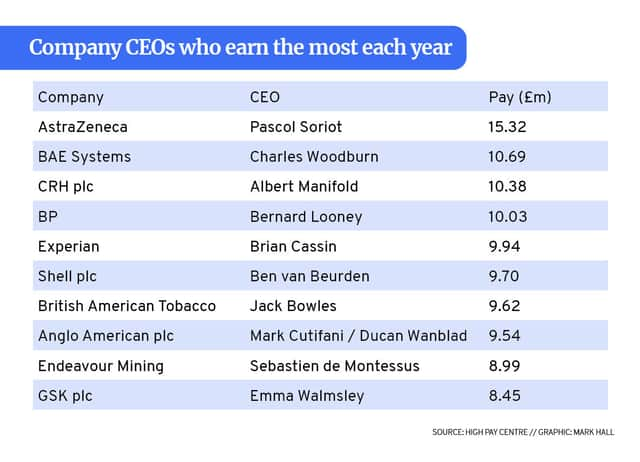UK top chief executives given 16% pay rise last year while Rishi Sunak told workers to have wage restraint
and live on Freeview channel 276
Chief executives as the UK's biggest companies received on average a £500,000 pay rise in 2022 while most people were battling the cost of living crisis, new research shows.
The High Pay Centre has found that the salary of the CEOs at Britain’s FTSE 100 firms surged by 16% in 2022, when the pay of most workers was struggling to keep up with inflation. At the time, the government had been refusing to give striking public sector workers double-digit pay increases, warning of a wage price spiral.
Research from easyMoney shows that the average UK salary increased by just 6.8% in 2022, lagging far behind inflation at 9.1%. The TUC said this showed that "under the Tories Britain has become a land of grotesque extremes".
In June, Rishi Sunak told workers that they need to "recognise the economic context we are in". Bank of England governor Andrew Bailey has also placed the responsibility for rising inflation on the shoulders of working people, saying that we “cannot continue to have the current level of wage increases”.
However, this research shows that country's fat cats received, on average, significantly higher pay rises than most public sector workers and those involved in industrial disputes. The High Pay Centre found that the median FTSE 100 CEO is now paid 118 times the average UK full-time worker, up from 108 times in 2021 and 79 times in 2020.
It comes after the International Monetary Fund warned that corporate greed has been the biggest driver of inflation in Europe, with companies increasing prices by more than the inflated costs of energy.


High Pay Centre director, Luke Hildyard, said: "At a time when so many households are struggling with living costs, an economic model that prioritises a half a million pound pay rise for executives who are already multi millionaires is surely going wrong somewhere.
"How major employers distribute the wealth that their workforce creates has a big impact on people’s living standards. We need to give workers more voice on company boards, strengthen trade union rights and enable low- and middle- income earners to get a fairer share in relation to those at the top."
Trades Union Congress general secretary Paul Nowak said: “While millions of families have seen their budgets shredded by the cost of living crisis, City directors have enjoyed bumper pay rises.
“This is why workers must be given seats on company boards to inject some much-needed common sense and restraint. We need an economy that delivers better living standards for all - not just those at the top.
“But under the Tories Britain has become a land of grotesque extremes. As households across the country have struggled to put food on the table, sales of Porsches have hit record levels.”
While the New Economics Foundation said: "This is an insult. Most of us are struggling to get by after years of wages shrinking, but the richest few continue to see their wealth grow as they take more than their fair share. It's time to Share The Wealth we all help create."


On Monday (21 August), Downing Street was asked about 8.2% wage growth across private firms, after Rishi Sunak's previous comments about inflation. Politico reported that the Prime Minister's spokesperson said anyone with a high salary “will rightly be expected to justify” it, but “fundamentally we do not dictate to private sector companies how they pay their staff".
The High Pay Centre found that median pay for a FTSE 100 CEO increased from £3.38 million in 2021 to £3.91 million in 2022, having dropped as low as £2.46m in 2020. It said the figures are based on pay disclosures made in annual reports, for companies’ financial years ending in 2022.
The highest-paid CEO was AstraZeneca's Pascal Soriot at £15.32 million. BP's chief executive Bernard Looney was the fourth-highest paid CEO with pay of £10.03 million. It recently announced £2.4 billion profits. Shell plc's CEO Ben van Beurden raked in £9.7 million in pay, with the company recently announcing profits of £3.9 billion.
The High Pay Centre is calling for requirements for companies to include a minimum of two elected workforce representatives on the remuneration committees that set pay, guaranteed trade union access to workplaces to keep staff informed about union benefits and a requirement provide more detailed disclosures about pay of top earners beyond the executives.


It comes after increased calls for windfall taxes and nationalisation of utilities. Former Labour leader Jeremy Corbyn, who is now sits as an independent MP, previously told NationalWorld: "It is ludicrous that energy companies can be allowed to make such extortionate profits while millions of people are struggling to pay their bills. This is not a cost-of-living crisis. This is a cost-of-greed crisis. It doesn’t have to be this way. There is an alternative: bring energy – as well as water, rail and mail - into public ownership."
While Labour MPs have been putting pressure on Sir Keir Starmer to call for a windfall tax on excess bank profits, after Lloyds and Santander revealed that their pre-tax profits for the first half of 2023 rose by 23% and 18% respectively.
Former Shadow Home Secretary Diane Abbott told NationalWorld: “The banks are clearly profiteering. This is contributing to the squeeze on the economy. Of course, there should be a tax on windfall profits, with the funds used to ease the cost of living crisis."
While Clive Lewis MP commented: “Banks’ bumper profits are being funded by public impoverishment. That’s the sign of an economic system that needs to change.
“Our economy is only as healthy as the members of the public who keep it going. Where is the public benefit of a highly profitable banking sector, if people can’t afford to put a roof over their head, or keep their small business running to serve a local community?
“In the long term we need more progressive wealth taxes and the break up of the banking industry, ensuring we have a mix of banks, including the creation of a healthy, localised banking industry that serves communities first. In the short term, we need to redistribute unearned profits from banks to the public through a windfall tax.”
Comment Guidelines
National World encourages reader discussion on our stories. User feedback, insights and back-and-forth exchanges add a rich layer of context to reporting. Please review our Community Guidelines before commenting.
